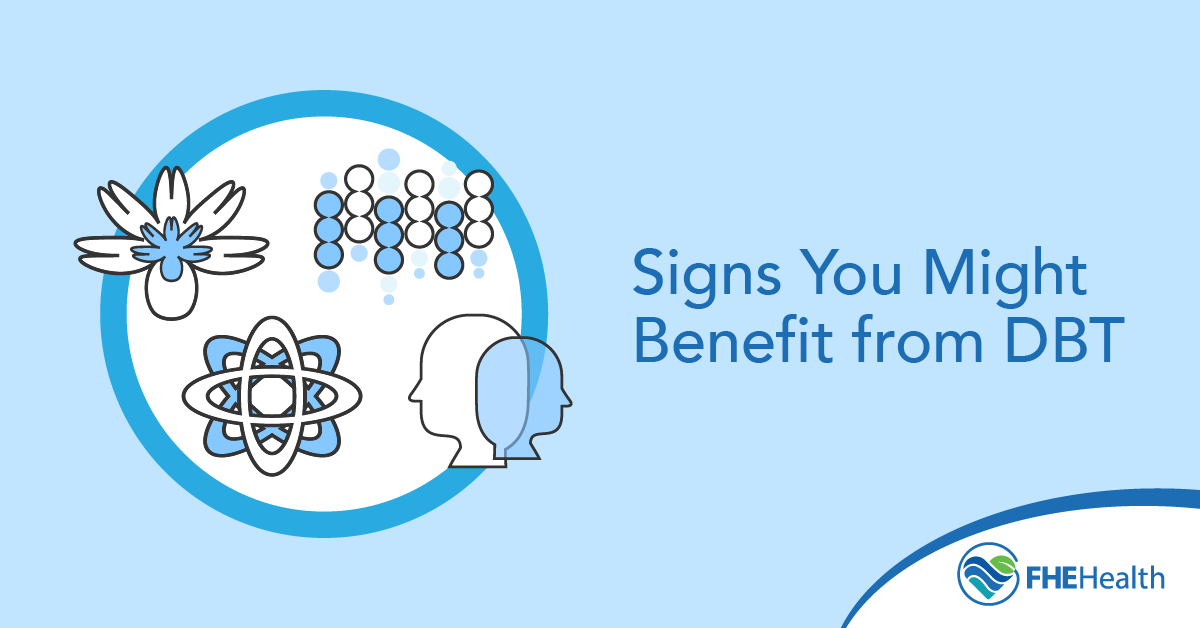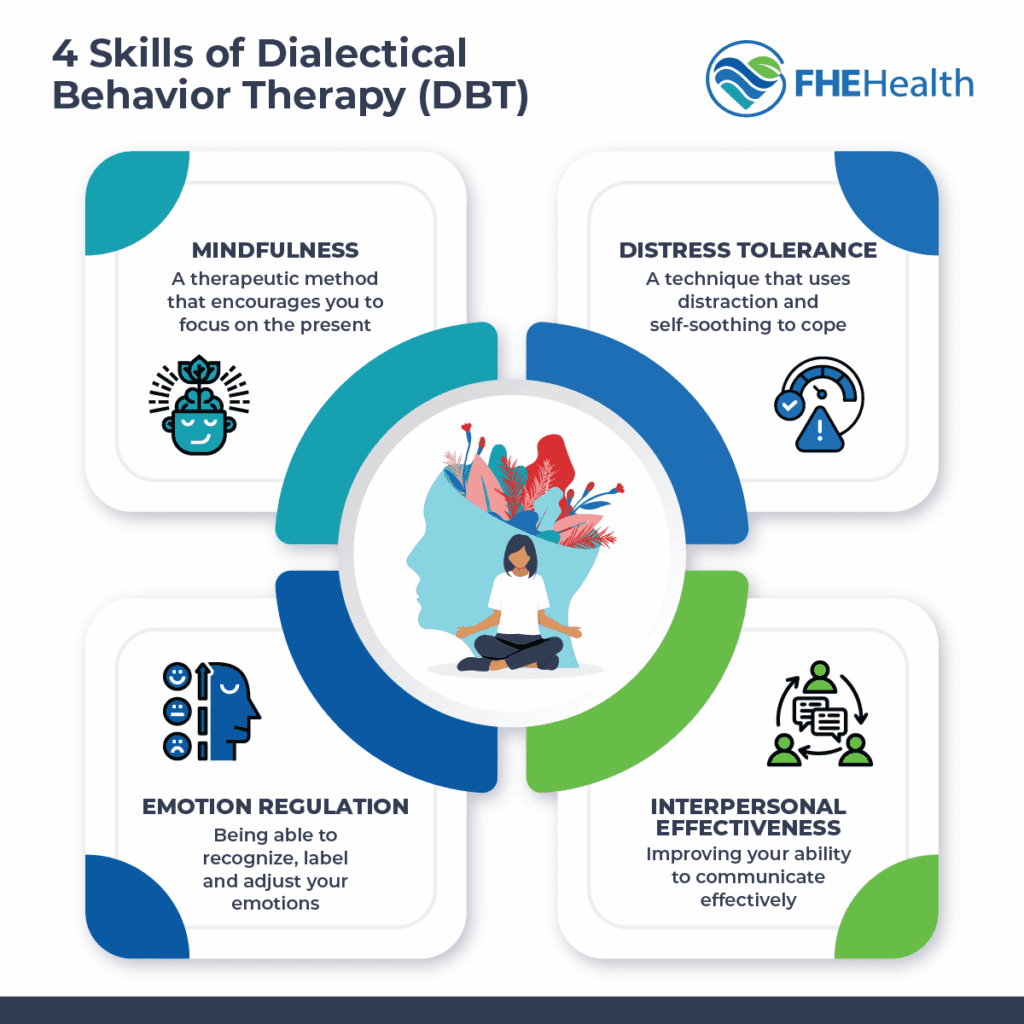
Have you ever felt overwhelmed by intense emotions? Maybe you’ve struggled to maintain stable relationships or found yourself stuck in self-destructive patterns. These experiences can be difficult to navigate and change, especially without the right support. That’s where dialectical behavior therapy (DBT) comes in.
DBT is designed to help individuals who struggle with intense emotions, impulsive behaviors and unstable relationships. In this article, we’ll explore some common signs that you might benefit from DBT — and how it could help you move forward with more confidence.
What Is DBT, and How Does It Work?
Dialectical behavior therapy is a type of talk therapy that helps people manage emotional dysregulation, build healthier coping mechanisms and improve quality of life. Originally developed for individuals with borderline personality disorder, DBT has since proven effective for a range of mental health challenges.
This treatment typically includes four key components: individual therapy, group skills training, phone coaching and consultation for therapists. This comprehensive approach ensures clients receive both emotional support and practical tools for managing their day-to-day challenges. Here’s what you can expect from DBT sessions:
- Individual therapy. These one-on-one sessions focus on identifying problem behaviors, setting goals and applying DBT skills to real-life situations.
- Group skills training. Group classes help reinforce core DBT skills, including mindfulness, distress tolerance, emotion regulation and interpersonal effectiveness.
- Phone coaching. Therapists may offer brief support between sessions to help clients apply DBT skills in moments of crisis or emotional distress.
- Homework and practice. Clients are encouraged to complete weekly assignments, such as tracking emotions or using specific skills, to apply what they learn outside of therapy.
- Mindfulness-based techniques: Practicing mindfulness is a core part of DBT. Clients learn how to stay present and nonjudgmental, especially during emotionally intense moments.
Together, these components help clients strengthen their self-control, navigate difficult relationships and cope with life’s challenges.
Who Is DBT Best Suited For?
DBT can support a wide range of mental health conditions, as well as general emotional dysregulation symptoms. Here are some groups DBT is best suited for:
- Individuals with BPD. BPD, which affects up to 2.7% of the general population, is linked to increased suicide risk. DBT can help address emotional instability and impulsive behaviors.
- People who self-harm or experience suicidal thoughts. DBT includes crisis management strategies and coping skills to reduce self-injury and chronic suicidal ideation.
- Those with intense emotional reactions. If you often experience emotions more strongly or for longer periods than others, DBT offers emotion regulation strategies that can help.
- Individuals with depression or anxiety. The structured, skills-based approach of DBT can be effective for people who have depression or anxiety and haven’t found relief through traditional talk therapy alone.
- People with PTSD or trauma histories. DBT can help trauma survivors manage emotional dysregulation and develop safer coping strategies, especially when used alongside trauma-specific treatments.
- Those who struggle with relationships. If you frequently experience conflict, have difficulty setting boundaries or feel misunderstood in relationships, DBT can strengthen your interpersonal effectiveness.
- People with eating disorders or substance use issues. DBT is often used as part of treatment for binge eating, bulimia and addiction, especially when these behaviors are linked to emotional dysregulation.

Skills Learned in DBT and Their Everyday Impact
One of the key strengths of DBT is its practical, skills-based approach. Clients don’t just talk about their problems — they learn specific tools to manage emotions, navigate relationships and handle distress more effectively. These skills can be applied immediately in everyday situations, making DBT a highly empowering form of therapy.
Here are the four core DBT skills and how they can make a difference in daily life:
- Mindfulness. Mindfulness teaches you how to stay present in the moment without judgment. It can improve focus and help you respond more calmly in stressful situations.
- Distress tolerance. These DBT skills help you safely manage emotional crises. They emphasize healthy coping mechanisms, such as breathing techniques or grounding exercises, over self-harm and impulsive actions.
- Emotion regulation. Emotion regulation teaches you how to understand, name and manage intense emotions. This can improve mood stability and prevent emotional outbursts.
- Interpersonal effectiveness. This skill set involves communicating clearly and setting healthy boundaries in relationships, leading to better personal relationships and increased self-respect.
By practicing these skills consistently, many people in DBT find they’re better equipped to handle everyday challenges — whether it’s navigating a difficult conversation, managing anxiety at work or simply making more thoughtful decisions in the moment.
DBT vs. CBT: How DBT Differs From Other Therapies
When evaluating different therapy options, many people consider DBT and cognitive behavioral therapy (CBT).
Both CBT and DBT are evidence-based approaches rooted in the idea that thoughts, emotions and behaviors are interconnected. However, while they share some similarities, DBT introduces unique elements that set it apart — especially for people dealing with chronic crises or relationship instability.
Here are some key differences between DBT vs. CBT:
- Focus on emotion regulation. While CBT primarily targets unhelpful thought patterns to change behavior, DBT goes a step further by teaching skills to manage the powerful emotions that often drive those thoughts and behaviors.
- Mindfulness as a core skill. CBT may touch on mindfulness, but DBT fully integrates it as a foundational component. Mindfulness helps clients stay grounded, observe their thoughts nonjudgmentally and reduce emotional reactivity.
- Dialectical thinking. DBT emphasizes the concept of dialectics, which involves holding two seemingly opposite ideas at once — such as “I’m doing the best I can” and “I need to try harder.” This mindset encourages balance and reduces black-and-white thinking.
- Crisis survival tools. Unlike CBT, DBT offers specific distress tolerance skills designed to help people get through overwhelming moments without making impulsive or harmful choices.
- Structure and support between sessions. DBT often includes phone coaching and a team-based treatment model to help clients apply skills in real time — something not typically found in standard CBT.
How to Start DBT With a Trained Professional
If you or a loved one is struggling with intense emotions, self-destructive behaviors or ongoing relationship challenges, DBT could be a life-changing resource. With the right support and skills, real and lasting change is possible.
Contact FHE Health to learn more about DBT and how it can help you take meaningful steps toward healing and emotional resilience.






